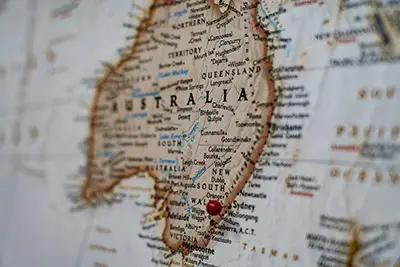Medical cannabis was legalised in 2016 by the Federal Government in Australia. This process involved an inquiry and legislation changes to the Narcotic Drugs Act 1967 for cannabis to be approved for medical use. Even now, there are strict regulations placed on the prescription, cultivation, distribution, and consumption of medicinal cannabis. This is all in an attempt to control the quality of cannabis and ensure patients are prescribed safe and reliable medicines.

Medical cannabis history in Australia
The First Fleet in 1788 brought the first recorded hemp seeds to Australia’s shores. Before then, its presence could be traced back as far as 2800 BC in Ancient China. Hemp found its way to Australia as part of a proposal to use the land as a commercial hemp production plant. The hemp industry had propped up Britain’s economy during the Age of Imperialism, but they depended on Russia as their supplier. By setting up a shop in Australia, Britain could control their own supply.
Since then, cannabis production has continued in Australia, consumed mainly for medical purposes. It was restricted to only medicinal and scientific use in the 1920s. The ACT was the first to outlaw cannabis in 1926. This move was quickly followed up in 1927 by Victoria. South Australia, New South Wales, and Queensland cracked down on their cannabis laws in the 30s, whereas Western Australia and Tasmania didn’t introduce strict controls until the mid-to-late 1950s.
The commonwealth government implemented the Narcotic Drugs Act 1967, legislation which puts in place some of Australia’s obligations under the Single Convention Narcotics on Drugs. Most of these obligations referred to the licensing, distribution, and regulation of cannabis. Fast forward to 2016, and Australia made a few changes to the Narcotic Drugs Act. This made growing cannabis for scientific and medicinal reasons legal. Furthermore, in 2017, hemp was declared legal for human consumption.
Right now, it’s still illegal in most Australian states to use, possess, or sell cannabis without having a license or prescription. Because of the laws surrounding production, distribution, and consumption, cannabis in Australia is highly regulated and quality-controlled.
Help is at Hand
Get free information and assistance quickly by filling out the contact form below.
Forms of medical cannabis products in Australia
There are many different forms of prescription cannabis products available legally in Australia. The main product types are oral, inhaled, and topical formulas. Coming in various forms and strengths, they cater to a wide range of patient requirements. Cannabis oils and vaporised medications are the most commonly prescribed, with many variations within each product type.
Medical cannabis products have unique compositions of phytocompounds. They contain different amounts of chemicals such as cannabinoids, terpenes and flavonoids. Typically, medical cannabis products are primarily composed of tetrahydrocannabinol (THC) or cannabidiol (CBD). Each of these cannabinoids interacts differently with the body’s endocannabinoid system (ECS). This makes them more suitable for different situations and conditions.

Contact Us For Free Assistance
"*" indicates required fields
Medical cannabis laws by state
Although medicinal cannabis has been legalised across Australia, the specifics of its legality vary from state to state. In general, access to cannabis for medical purposes is highly regulated and very limited. However, most medical practitioners are allowed to prescribe cannabis in appropriate situations with the correct government approvals or licenses.
In the Australian Capital Territory, medicinal cannabis is allowed on a case-by-case basis. In appropriate situations, you may possess, distribute, and consume cannabis with the correct license, permit, or prescription. To prescribe medicinal cannabis, doctors need to have approval from both the Therapeutic Goods Administration and the ACT chief health officer. This is separate from the ACT’s changes to state laws in 2020, allowing the use of cannabis for personal use in certain amounts.
We’ve broken down all the rules and regulations for residents of the Australian Capital Territory.
Medical Cannabis in the ACTMedicinal cannabis is legal in New South Wales in medical and scientific situations. Doctors can prescribe it when necessary with TGA approval. The government has also established the Centre for Medicinal Cannabis Research and Innovation to conduct community education and keep track of clinical trials.
Medical Cannabis in NSWIn the Northern Territory, medicinal cannabis is legal with a prescription. In November 2019, the first NT resident received a medicinal cannabis prescription. However, many patients in the NT will need to find a telehealth doctor in another state because there are few authorised prescribers based locally, and the area’s remote nature makes it difficult for residents to travel to the right doctors.
Medical Cannabis in NTRegistered medical practitioners are allowed to prescribe medicinal cannabis in Queensland if it’s medically necessary. In the past, they had to get approval from the Commonwealth. However, new legislation in 2020 determined that any Queensland medical practitioner could prescribe Schedule 4 CBD or Schedule 8 THC or CBD oil without approval from health authorities.
Medical Cannabis in QLDYou can get medicinal cannabis in South Australia with a prescription. The prescription needs to come from an authorised SA medical practitioner. In some cases, the practitioner must seek approval under South Australian Controlled Substances legislation. This approval is subject to exceptions such as elderly people or terminally ill patients.
Medical Cannabis in SAMedical practitioners can prescribe medicinal cannabis in Tasmania if they feel it’s the best course of treatment for a patient. To do this, they must acquire approval from the Commonwealth and state authorities.
Medical Cannabis in TASIn the state of Victoria, medicinal cannabis is legal when prescribed by a doctor or nurse practitioner, usually with Commonwealth or state approval. Medicinal cannabis is prescribed when the doctor feels it will be beneficial to the patient. Beginning in 2022, practitioners can prescribe Schedule 8 medicinal cannabis to non-drug dependent patients without a Schedule 8 treatment permit.
Medical Cannabis in VICPrescriptions for medicinal cannabis can be given by any prescriber in WA if they have the appropriate government approval. Prescriptions need to align with the Medicines and Poisons legislation. As long as a WA-based medical practitioner provides your prescription, it can be dispensed at any pharmacy in the state.
Medicinal Cannabis in Perth & WAChat with our friendly team for queries.